高级英语第二册第三课课文翻译对照(修订版)
高级英语第二册课文翻译

Unit1 Pub Talk and the King's English酒吧闲聊与标准英语亨利费尔利人类的一切活动中,只有闲谈最宜于增进友谊,而且是人类特有的一种活动。
动物之间的信息交流,不论其方式何等复杂,也是称不上交谈的。
闲谈的引人人胜之处就在于它没有一个事先定好的话题。
它时而迂回流淌,时而奔腾起伏,时而火花四射,时而热情洋溢,话题最终会扯到什么地方去谁也拿不准。
要是有人觉得“有些话要说”,那定会大煞风景,使闲聊无趣。
闲聊不是为了进行争论。
闲聊中常常会有争论,不过其目的并不是为了说服对方。
闲聊之中是不存在什么输赢胜负的。
事实上,真正善于闲聊的人往往是随时准备让步的。
也许他们偶然间会觉得该把自己最得意的奇闻轶事选出一件插进来讲一讲,但一转眼大家已谈到别处去了,插话的机会随之而失,他们也就听之任之。
或许是由于我从小混迹于英国小酒馆的缘故吧,我觉得酒瞎里的闲聊别有韵味。
酒馆里的朋友对别人的生活毫无了解,他们只是临时凑到一起来的,彼此并无深交。
他们之中也许有人面临婚因破裂,或恋爱失败,或碰到别的什么不顺心的事儿,但别人根本不管这些。
他们就像大仲马笔下的三个火枪手一样,虽然日夕相处,却从不过问彼此的私事,也不去揣摸别人内心的秘密。
有一天晚上的情形正是这样。
人们正漫无边际地东扯西拉,从最普通的凡人俗事谈到有关木星的科学趣闻。
谈了半天也没有一个中心话题,事实上也不需要有一个中心话题。
可突然间大伙儿的话题都集中到了一处,中心话题奇迹般地出现了。
我记不起她那句话是在什么情况下说出来的——她显然不是预先想好把那句话带到酒馆里来说的,那也不是什么非说不可的要紧话——我只知道她那句话是随着大伙儿的话题十分自然地脱口而出的。
“几天前,我听到一个人说‘标准英语’这个词语是带贬义的批评用语,指的是人们应该尽量避免使用的英语。
”此语一出,谈话立即热烈起来。
有人赞成,也有人怒斥,还有人则不以为然。
最后,当然少不了要像处理所有这种场合下的意见分歧一样,由大家说定次日一早去查证一下。
新潮实用英语第二册 Unit Three原文对照翻译

Text A Everyday Life in Space1 (The following is part of the interview with Jean-Pierre Haigneré who spent 6 months on board Mir, in 1999.) Why do people do a lot of sport in space?(以下是对吉恩·皮埃尔·海格尼的部分采访内容,他在1999在“和平号”空间站住了6个月)为什么生活在太空中人们需做大量的运动?2 For the body to be in a state of weightlessness is a bit like lying for weeks in a hospital bed. The muscles and bones that do the carrying are no longer called upon. They no longer need to bear the body and so they quickly start softening. Bones lose 1% of their density every month!That’s why we have to do at least two hours of sport on the machines every day.因为处于失重状态的身体有些类似于在病床上躺卧数周。
由于起支撑作用的肌肉与骨骼无需受力,不再承受体重, 因此它们开始迅速萎缩。
骨骼密度每月减少1%!这就是为何我们必须每天在健身器上做两小时的运动。
3 How does one sleep in space?人在太空如何睡眠?4 It’s a bit like camping, you sleep in a sleeping bag. Since there’s no up and down, you sleep “standing”! What’s important is to be attached to the wall,where there’s some space. That’s why the sleeping bags arecovered with straps. A wide belt can be used for those of us who, like on earth, need to feel the pressure of a surface against the body in order to sleep better. You mustn’t forget to put your hands in the bag, otherwise they’ll be dancing around all night!有点像野营,你是睡在睡袋中。
高级英语2第三版_张汉熙_课文翻译

Unit 2 Marrakech一具尸体抬过,成群的苍蝇从饭馆的餐桌上嗡嗡而起追逐过去,但几分钟过后又飞了回来。
一支人数不多的送葬队伍——其中老少尽皆男性,没有一个女的——沿着集贸市场,从一堆堆石榴摊子以及出租汽车和骆驼中间挤道而行,边走边悲痛地重复着一支短促的哀歌。
苍蝇之所以群起追逐是因为在这个地方死人的尸首从不装进棺木,只是用一块破布裹着放在一个草草做成的木头架子上,有四个朋友抬着送葬。
朋友们到了安葬场后,便在地上挖出一个一二英尺深的长方形坑,将尸首往坑里一倒。
再扔一些像碎砖头一样的干土块。
不立墓碑,不留姓名,什么识别标志都没有。
坟场只不过是一片土丘林立的荒野,恰似一片已废弃不用的建筑场地。
一两个月过后,就谁也说不准自己的亲人葬于何处了。
当你穿行也这样的城镇——其居民20万中至少有2万是除开一身聊以蔽体的破衣烂衫之外完全一无所有——当你看到那些人是如何生活,又如何动辄死亡时,你永远难以相信自己是行走在人类之中。
实际上,这是所有的殖民帝国赖以建立的基础。
这里的人都有一张褐色的脸,而且,人数书如此之多!他们真的和你意义同属人类吗?难道他们也会有名有姓吗?也许他们只是像彼此之间难以区分的蜜蜂或珊瑚虫一样的东西。
他们从泥土里长出来,受哭受累,忍饥挨饿过上几年,然后有被埋在那一个个无名的小坟丘里。
谁也不会注意到他们的离去。
就是那些小坟丘本身也过不了很久便会变成平地。
有时当你外出散步,穿过仙人掌丛时,你会感觉到地上有些绊脚的东西,只是在经过多次以后,摸清了其一般规律时,你才会知道你脚下踩的是死人的骷髅。
我正在公园里给一只瞪羚喂食。
动物中也恐怕只有瞪羚还活着时就让人觉得是美味佳肴。
事实上,人们只要看到它们那两条后腿就会联想到薄荷酱。
我现在喂着的这只瞪羚好象已经看透了我的心思。
它虽然叼走了拿在手上的一块面包,但显然不喜欢我这个人。
它一面啃食着面包,一面头一低向我顶过来,再啃一下面包又顶过来一次。
它大概还因为把我赶开之后那块面包仍会悬在空中。
高级英语book2 lesson3

Words and expressions
Meander [miAndE] n.漫止, 弯曲, 曲流 ramble v.漫止, 蜿蜒而流 wander aimlessly or idly Meandering adj. Meanderer n. Eg: We meandered the lower reaches of the river.
1. Their marriage may be on the rocks (P.3) 2. They got out of bed on the wrong side (P.3) 3. The conversation was on wings (P.8) 4. The Norman lords of course turned up their noses at it (P.10)
Words and expressions
Churl [tFE:l] n. 农业工人,乡下人,粗野的人, 吝啬鬼 A farm laborer; peasant Churlish adj.
Words and expressions
out of 在...外 从里面 由于 缺乏, 放弃 丧失 在...范围外 用...制成 来自 与...不相宜, 不相称 离开, 脱离
Words and expressions
Bind [baind] tie up v. 绑, 镶边, 装订, 凝固, 约束 bind down 捆, 绑 bind in 并合, 组合 bind up v.包扎, 装订 bind up in 专心致力于
高级英语2第三版_张汉熙_课文翻译

Unit 1 Pub T alk and the King’s English人类的一切活动中,只有闲谈最宜于增进友谊,而且是人类特有的一种活动。
动物之间的信息交流,不论其方式何等复杂,也是称不上交谈的。
闲谈的引人人胜之处就在于它没有一个事先定好的话题。
它时而迂回流淌,时而奔腾起伏,时而火花四射,时而热情洋溢,话题最终会扯到什么地方去谁也拿不准。
要是有人觉得"有些话要说",那定会大煞风景,使闲聊无趣。
闲聊不是为了进行争论。
闲聊中常常会有争论,不过其目的并不是为了说服对方。
闲聊之中是不存在什么输赢胜负的。
事实上,真正善于闲聊的人往往是随时准备让步的。
也许他们偶然间会觉得该把自己最得意的奇闻轶事选出一件插进来讲一讲,但一转眼大家已谈到别处去了,插话的机会随之而失,他们也就听之任之。
或许是由于我从小混迹于英国小酒馆的缘故吧,我觉得酒瞎里的闲聊别有韵味。
酒馆里的朋友对别人的生活毫无了解,他们只是临时凑到一起来的,彼此并无深交。
他们之中也许有人面临婚因破裂,或恋爱失败,或碰到别的什么不顺心的事儿,但别人根本不管这些。
他们就像大仲马笔下的三个火枪手一样,虽然日夕相处,却从不过问彼此的私事,也不去揣摸别人内心的秘密。
有一天晚上的情形正是这样。
人们正漫无边际地东扯西拉,从最普通的凡人俗事谈到有关木星的科学趣闻。
谈了半天也没有一个中心话题,事实上也不需要有一个中心话题。
可突然间大伙儿的话题都集中到了一处,中心话题奇迹般地出现了。
我记不起她那句话是在什么情况下说出来的——她显然不是预先想好把那句话带到酒馆里来说的,那也不是什么非说不可的要紧话——我只知道她那句话是随着大伙儿的话题十分自然地脱口而出的。
"几天前,我听到一个人说‘标准英语’这个词语是带贬义的批评用语,指的是人们应该尽量避免使用的英语。
"此语一出,谈话立即热烈起来。
有人赞成,也有人怒斥,还有人则不以为然。
最后,当然少不了要像处理所有这种场合下的意见分歧一样,由大家说定次日一早去查证一下。
高级英语第二册第三课课文翻译对照(修订版)

第三课酒肆闲聊与标准英语 1人类的一切活动中,只有闲谈最宜于增进友谊,而且是人类特有的一种活动。
动物之间的信息交流,不论其方式何等复杂,也是称不上交谈的。
2闲谈的引人人胜之处就在于它没有一个事先定好的话题。
它时而迂回流淌,时而奔腾起伏,时而火花四射,时而热情洋溢,话题最终会扯到什么地方去谁也拿不准。
要是有人觉得“有些话要说”,那定会大煞风景,使闲聊无趣。
闲聊不是为了进行争论。
闲聊中常常会有争论,不过其目的并不是为了说服对方。
闲聊之中是不存在什么输赢胜负的。
事实上,真正善于闲聊的人往往是随时准备让步的。
也许他们偶然间会觉得该把自己最得意的奇闻轶事选出一件插进来讲一讲,但一转眼大家已谈到别处去了,插话的机会随之而失,他们也就听之任之。
3或许是由于我从小混迹于英国小酒馆的缘故吧,我觉得酒瞎里的闲聊别有韵味。
酒馆里的朋友对别人的生活毫无了解,他们只是临时凑到一起来的,彼此并无深交。
他们之中也许有人面临婚因破裂,或恋爱失败,或碰到别的什么不顺心的事儿,但别人根本不管这些。
他们就像大仲马笔下的三个火枪手一样,虽然日夕相处,却从不过问彼此的私事,也不去揣摸别人内心的秘密。
4有一天晚上的情形正是这样。
人们正漫无边际地东扯西拉,从最普通的凡人俗事谈到有关木星的科学趣闻。
谈了半天也没有一个中心话题,事实上也不需要有一个中心话题。
可突然间大伙儿的话题都集中到了一处,中心话题奇迹般地出现了。
我记不起她那句话是在什么情况下说出来的——她显然不是预先想好把那句话带到酒馆里来说的,那也不是什么非说不可的要紧话——我只知道她那句话是随着大伙儿的话题十分自然地脱口而出的。
5“几天前,我听到一个人说‘标准英语’这个词语是带贬义的批评用语,指的是人们应该尽量避免使用的英语。
” 6此语一出,谈话立即热烈起来。
有人赞成,也有人怒斥,还有人则不以为然。
最后,当然少不了要像处理所有这种场合下的意见分歧一样,由大家说定次日一早去查证一下。
高级英语第二册课文翻译

高级英语第二册课文翻译Unit1 Pub Talk and the King's English酒吧闲聊与标准英语亨利?费尔利人类的一切活动中,只有闲谈最宜于增进友谊,而且是人类特有的一种活动。
动物之间的信息交流,不论其方式何等复杂,也是称不上交谈的。
闲谈的引人人胜之处就在于它没有一个事先定好的话题。
它时而迂回流淌,时而奔腾起伏,时而火花四射,时而热情洋溢,话题最终会扯到什么地方去谁也拿不准。
要是有人觉得“有些话要说”,那定会大煞风景,使闲聊无趣。
闲聊不是为了进行争论。
闲聊中常常会有争论,不过其目的并不是为了说服对方。
闲聊之中是不存在什么输赢胜负的。
事实上,真正善于闲聊的人往往是随时准备让步的。
也许他们偶然间会觉得该把自己最得意的奇闻轶事选出一件插进来讲一讲,但一转眼大家已谈到别处去了,插话的机会随之而失,他们也就听之任之。
或许是由于我从小混迹于英国小酒馆的缘故吧,我觉得酒瞎里的闲聊别有韵味。
酒馆里的朋友对别人的生活毫无了解,他们只是临时凑到一起来的,彼此并无深交。
他们之中也许有人面临婚因破裂,或恋爱失败,或碰到别的什么不顺心的事儿,但别人根本不管这些。
他们就像大仲马笔下的三个火枪手一样,虽然日夕相处,却从不过问彼此的私事,也不去揣摸别人内心的秘密。
有一天晚上的情形正是这样。
人们正漫无边际地东扯西拉,从最普通的凡人俗事谈到有关木星的科学趣闻。
谈了半天也没有一个中心话题,事实上也不需要有一个中心话题。
可突然间大伙儿的话题都集中到了一处,中心话题奇迹般地出现了。
我记不起她那句话是在什么情况下说出来的——她显然不是预先想好把那句话带到酒馆里来说的,那也不是什么非说不可的要紧话——我只知道她那句话是随着大伙儿的话题十分自然地脱口而出的。
“几天前,我听到一个人说‘标准英语’这个词语是带贬义的批评用语,指的是人们应该尽量避免使用的英语。
”此语一出,谈话立即热烈起来。
有人赞成,也有人怒斥,还有人则不以为然。
高级英语第二册课文翻译及 词汇
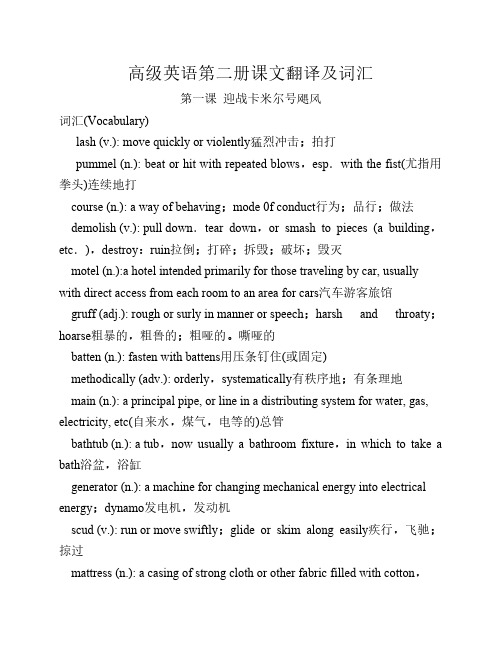
高级英语第二册课文翻译及词汇第一课迎战卡米尔号飓风词汇(Vocabulary)lash (v.): move quickly or violently猛烈冲击;拍打pummel (n.): beat or hit with repeated blows,esp.with the fist(尤指用拳头)连续地打course (n.): a way of behaving;mode 0f conduct行为;品行;做法demolish (v.): pull down.tear down,or smash to pieces (a building,etc.),destroy:ruin拉倒;打碎;拆毁;破坏;毁灭motel (n.):a hotel intended primarily for those traveling by car, usually with direct access from each room to an area for cars汽车游客旅馆gruff (adj.): rough or surly in manner or speech;harsh and throaty;hoarse粗暴的,粗鲁的;粗哑的。
嘶哑的batten (n.): fasten with battens用压条钉住(或固定)methodically (adv.): orderly,systematically有秩序地;有条理地main (n.): a principal pipe, or line in a distributing system for water, gas, electricity, etc(自来水,煤气,电等的)总管bathtub (n.): a tub,now usually a bathroom fixture,in which to take a bath浴盆,浴缸generator (n.): a machine for changing mechanical energy into electrical energy;dynamo发电机,发动机scud (v.): run or move swiftly;glide or skim along easily疾行,飞驰;掠过mattress (n.): a casing of strong cloth or other fabric filled with cotton,hair,foam rubber,etc.床垫;褥子pane (n.):a single division of a window,etc.,consisting of a sheet of glass in a frame;such a sheet of glass窗格;窗格玻璃disintegrate (v.): separate into parts or fragments; break up;disunite分裂,分解,裂成碎块blast (n.): a strong rush of(air or wind)一股(气流);一阵(风)douse (n.): plunge or thrust suddenly into liquid;drench; pour liquid over 把…浸入液体里;使浸透;泼液体在…上brigade (n.): a group of people organized to function。
高级英语第二册第三课课文翻译对照(修订版)
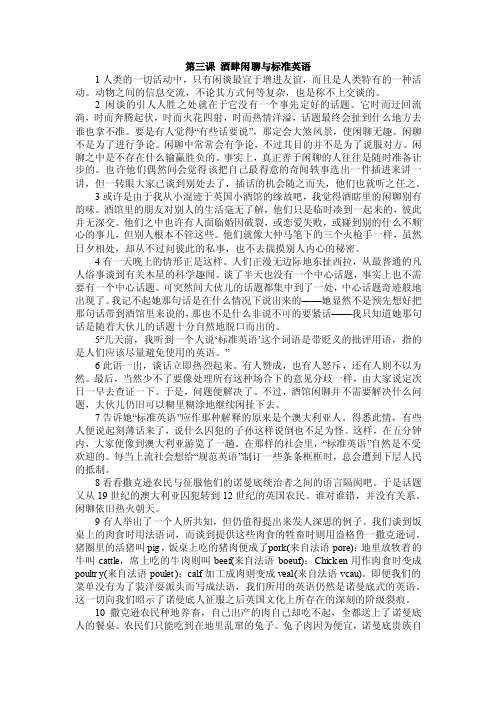
第三课酒肆闲聊与标准英语1人类的一切活动中,只有闲谈最宜于增进友谊,而且是人类特有的一种活动。
动物之间的信息交流,不论其方式何等复杂,也是称不上交谈的。
2闲谈的引人人胜之处就在于它没有一个事先定好的话题。
它时而迂回流淌,时而奔腾起伏,时而火花四射,时而热情洋溢,话题最终会扯到什么地方去谁也拿不准。
要是有人觉得“有些话要说”,那定会大煞风景,使闲聊无趣。
闲聊不是为了进行争论。
闲聊中常常会有争论,不过其目的并不是为了说服对方。
闲聊之中是不存在什么输赢胜负的。
事实上,真正善于闲聊的人往往是随时准备让步的。
也许他们偶然间会觉得该把自己最得意的奇闻轶事选出一件插进来讲一讲,但一转眼大家已谈到别处去了,插话的机会随之而失,他们也就听之任之。
3或许是由于我从小混迹于英国小酒馆的缘故吧,我觉得酒瞎里的闲聊别有韵味。
酒馆里的朋友对别人的生活毫无了解,他们只是临时凑到一起来的,彼此并无深交。
他们之中也许有人面临婚因破裂,或恋爱失败,或碰到别的什么不顺心的事儿,但别人根本不管这些。
他们就像大仲马笔下的三个火枪手一样,虽然日夕相处,却从不过问彼此的私事,也不去揣摸别人内心的秘密。
4有一天晚上的情形正是这样。
人们正漫无边际地东扯西拉,从最普通的凡人俗事谈到有关木星的科学趣闻。
谈了半天也没有一个中心话题,事实上也不需要有一个中心话题。
可突然间大伙儿的话题都集中到了一处,中心话题奇迹般地出现了。
我记不起她那句话是在什么情况下说出来的——她显然不是预先想好把那句话带到酒馆里来说的,那也不是什么非说不可的要紧话——我只知道她那句话是随着大伙儿的话题十分自然地脱口而出的。
5“几天前,我听到一个人说…标准英语‟这个词语是带贬义的批评用语,指的是人们应该尽量避免使用的英语。
(完整word版)Unit3BorntoWin新编大学英语第二版第二册课文翻译
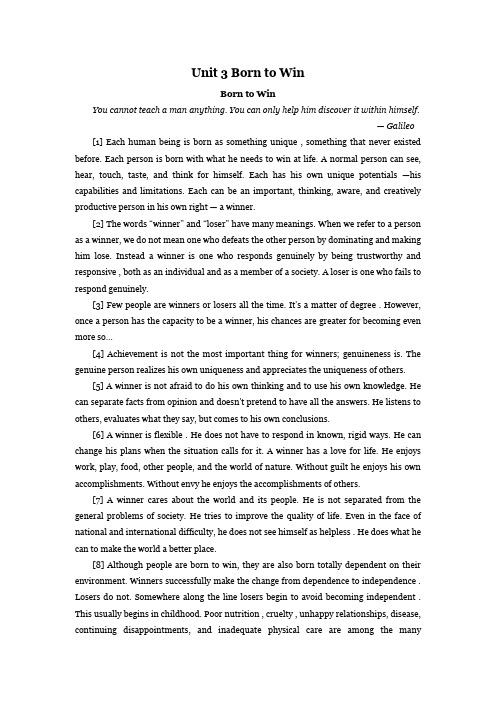
Unit 3 Born to WinBorn to WinYou cannot teach a man anything. You can only help him discover it within himself.— Galileo[1] Each human being is born as something unique , something that never existed before. Each person is born with what he needs to win at life. A normal person can see, hear, touch, taste, and think for himself. Each has his own unique potentials —his capabilities and limitations. Each can be an important, thinking, aware, and creatively productive person in his own right — a winner.[2] The words “winner” and “loser” have many meanings. When we refer to a person as a winner, we do not mean one who defeats the other person by dominating and making him lose. Instead a winner is one who responds genuinely by being trustworthy and responsive , both as an individual and as a member of a society. A loser is one who fails to respond genuinely.[3] Few people are winners or losers all the time. It's a matter of degree . However, once a person has the capacity to be a winner, his chances are greater for becoming even more so…[4] Achievement is not the most important thing for winners; genuineness is. The genuine person realizes his own uniqueness and appreciates the uniqueness of others.[5] A winner is not afraid to do his own thinking and to use his own knowledge. He can separate facts from opinion and doesn't pretend to have all the answers. He listens to others, evaluates what they say, but comes to his own conclusions.[6] A winner is flexible . He does not have to respond in known, rigid ways. He can change his plans when the situation calls for it. A winner has a love for life. He enjoys work, play, food, other people, and the world of nature. Without guilt he enjoys his own accomplishments. Without envy he enjoys the accomplishments of others.[7] A winner cares about the world and its people. He is not separated from the general problems of society. He tries to improve the quality of life. Even in the face of national and international difficulty, he does not see himself as helpless . He does what he can to make the world a better place.[8] Although people are born to win, they are also born totally dependent on their environment. Winners successfully make the change from dependence to independence . Losers do not. Somewhere along the line losers begin to avoid becoming independent . This usually begins in childhood. Poor nutrition , cruelty , unhappy relationships, disease, continuing disappointments, and inadequate physical care are among the manyexperiences that contribute to making people losers.[9] A loser is held back by his low capacity to appropriately express himself through a full range of possible behavior. He may be unaware of other choices for his life if the path he chooses goes nowhere. He is afraid to try new things. He repeats not only his own mistakes and often repeats those of his family and culture.[10] A loser has difficulty giving and receiving love. He does not enter into close, honest, direct relationships with others. Instead, he tries to manipulate them into living up to his expectations and channels his energies into living up to their expectations.生而成功任何事都不可能由别人来教你,只能在别人的帮助下靠自己去发现。
(完整word版)高级英语2第三版_张汉熙_课文翻译
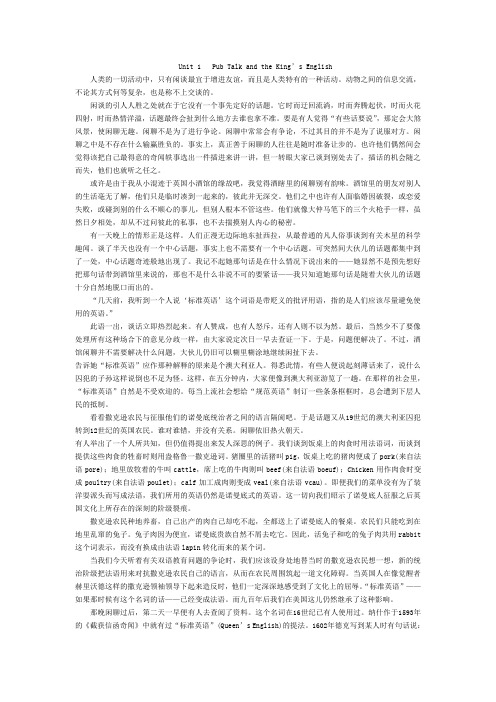
Unit 1 Pub Talk and the King’s English人类的一切活动中,只有闲谈最宜于增进友谊,而且是人类特有的一种活动。
动物之间的信息交流,不论其方式何等复杂,也是称不上交谈的。
闲谈的引人人胜之处就在于它没有一个事先定好的话题。
它时而迂回流淌,时而奔腾起伏,时而火花四射,时而热情洋溢,话题最终会扯到什么地方去谁也拿不准。
要是有人觉得“有些话要说”,那定会大煞风景,使闲聊无趣。
闲聊不是为了进行争论。
闲聊中常常会有争论,不过其目的并不是为了说服对方。
闲聊之中是不存在什么输赢胜负的。
事实上,真正善于闲聊的人往往是随时准备让步的。
也许他们偶然间会觉得该把自己最得意的奇闻轶事选出一件插进来讲一讲,但一转眼大家已谈到别处去了,插话的机会随之而失,他们也就听之任之。
或许是由于我从小混迹于英国小酒馆的缘故吧,我觉得酒瞎里的闲聊别有韵味。
酒馆里的朋友对别人的生活毫无了解,他们只是临时凑到一起来的,彼此并无深交。
他们之中也许有人面临婚因破裂,或恋爱失败,或碰到别的什么不顺心的事儿,但别人根本不管这些。
他们就像大仲马笔下的三个火枪手一样,虽然日夕相处,却从不过问彼此的私事,也不去揣摸别人内心的秘密。
有一天晚上的情形正是这样。
人们正漫无边际地东扯西拉,从最普通的凡人俗事谈到有关木星的科学趣闻。
谈了半天也没有一个中心话题,事实上也不需要有一个中心话题。
可突然间大伙儿的话题都集中到了一处,中心话题奇迹般地出现了。
我记不起她那句话是在什么情况下说出来的——她显然不是预先想好把那句话带到酒馆里来说的,那也不是什么非说不可的要紧话——我只知道她那句话是随着大伙儿的话题十分自然地脱口而出的。
“几天前,我听到一个人说‘标准英语’这个词语是带贬义的批评用语,指的是人们应该尽量避免使用的英语。
”此语一出,谈话立即热烈起来。
有人赞成,也有人怒斥,还有人则不以为然。
最后,当然少不了要像处理所有这种场合下的意见分歧一样,由大家说定次日一早去查证一下。
Unit 3课文文本和翻译 人教版高中英语必修第二册

人教版高中英语新教材必修二Unit 3课文文本和翻译STRONGER TOGETHER: HOW WE HAVE BEEN CHANGEDBY THE INTERNET我们一起更加强大:我们是如何被互联网改变的Much has been written about the wonders of the World Wide Web. There are countless articles telling us how the Internet has made our lives more convenient. We no longer have to wait in line or carry cash around when we go shopping. We can get the most updated information from large databases. We can download software, documents, and images whenever we need them. But the Internet has done much more for people than simply make life more convenient. People’s lives have been changed by online communities and social networks.关于万维网奇迹的文章有很多。
有无数的文章告诉我们互联网是如何使我们的生活更加方便。
当我们去购物时,我们不再需要排队或随身携带现金。
我们可以从大型数据库获得最新的信息。
我们可以随时下载软件、文档和图像。
但互联网为人们带来的不仅仅是简单地让生活更加便利。
在线社区和社交网络改变了人们的生活。
Jan Tchamani, an English teacher in Birmingham, UK, suddenly developed a serious illness and had to quit her job. At age 50, she found herself out of work and stuck at home with only her computer to keep her company. After a while, she discovered that surfing the Internet could help her feel less lonely and bored. She could listen to music, watch films, play games, and explore the world. She also joined an online group wh ere she could talk about her problems and get support and advice from others. She realised that one of the greatest benefits of the Internet was its ability to remove the distance that usually exists between people.英国伯明翰的一位英语教师简•夏曼尼突然得了重病,因此不得不辞职。
高中英语必修二unit3课文翻译

高中英语必修二unit3课文翻译篇一:高一英语人教版必修二Unit 3 课文内容Unit 3 WHO AM I?Over time I have been changed quite a lot. I began as a calculating machine in France in 1642. Although I was young I could simplify difficult sums. I developed very slowly and it took nearly two hundred years before I was built as an analytical machine by Charles Babbage. After I was programmed by an operator who used cards with holes, I could “think” logically and produce an answer quicker than any person. At that time it was considered a t echnological revolution and the start of my “artificial intelligence”. In 1936 my real father, Alan Turing, wrote a book about how I could be made to work as a “universal machine” to solve any difficult mathematical problem. From then on, I grew rapidly both in size and in brainpower. By the 1940s I had grown as large as a room, and I wondered if I would grow any larger. However, this reality also worriedmy designers. As time went by, I was made smaller. First as a PC(personal computer) and then as a laptop, I have been used in offices and homes since the 1970s.These changes only became possible as my memory improved. First it was stored in tubes, then on transistors and later on very small chips. As a result I totally changed my shape. As I have grown older I have also grown smaller. Over time my memory has developed so much that, like an elephant, I never forget anything I have been told! And my memory became so large that even I couldn’t believe it! But I was always so lonely standing there by myself, until in the early 1960s they gave me a family connected by a network. I was able to share my knowledge with others through the World Wide Web.Since the 1970s many new applications have been found for me. I have become very important in communication, finance and trade. I have also been put into robots and used to make mobile phones as well as help with medical operations. I have even been put into space rockets and sent to explore the Moon and Mars. Anyhow, my goal is to provide humans with a life of high quality. I am now truly filled with happiness that I am a devoted friend and helperof the human race!ANDY-THE ANDROID I’m part of an android football team. About once a year we are allowed to get together to play a game of football. I’m as big as a human. In fact, I look like one too. On the football team I’m a striker so I have to be able to run very fast. My computer chips help me to move and think like a human. For example, I have learned to signal to my teammates in computer language to give me the ball when I am open and have a good shot for a goal.My first football competition was in Nagoya, Japan several years ago. Last year our team went to Seattle, Washington in the USA. We won second place. Personally, I think the team that won first place cheated. They had developed a new type of program just before the competition. So we need to encourage our programmer to improve our intelligence too. We are determined to create an even better system. In a way our programmer is like our coach. She programs us with all the possible moves she has seen while watching human games. Then she prepares reliable moves to use if a new situation arises. In this way I can make up new moves using my “artificial intelligence”. I would really liketo play against a human team, for I have been programmed to act just like them. After all, with the help of my electronic brain which never forgets anything, using my intelligence is what I’m all about!篇二:高中英语必修2课文逐句翻译(人教新课标)1.必修二Unit1 IN SEARCH OF THE AMBER ROOM寻找琥珀屋Frederick William Ⅰ,the King of Prussia , could never have imagined that his greatest gift to the Russian people would have such an amazing history . 普鲁士国王腓特烈·威廉一世绝不可能想到他送给俄罗斯人民的厚礼会有这样一段令人惊讶的历史。
(完整word版)Unit3BorntoWin新编大学英语第二版第二册课文翻译

Unit 3 Born to WinBorn to WinYou cannot teach a man anything. You can only help him discover it within himself.— Galileo[1] Each human being is born as something unique , something that never existed before. Each person is born with what he needs to win at life. A normal person can see, hear, touch, taste, and think for himself. Each has his own unique potentials —his capabilities and limitations. Each can be an important, thinking, aware, and creatively productive person in his own right — a winner.[2] The words “winner” and “loser” have many meanings. When we refer to a person as a winner, we do not mean one who defeats the other person by dominating and making him lose. Instead a winner is one who responds genuinely by being trustworthy and responsive , both as an individual and as a member of a society. A loser is one who fails to respond genuinely.[3] Few people are winners or losers all the time. It's a matter of degree . However, once a person has the capacity to be a winner, his chances are greater for becoming even more so…[4] Achievement is not the most important thing for winners; genuineness is. The genuine person realizes his own uniqueness and appreciates the uniqueness of others.[5] A winner is not afraid to do his own thinking and to use his own knowledge. He can separate facts from opinion and doesn't pretend to have all the answers. He listens to others, evaluates what they say, but comes to his own conclusions.[6] A winner is flexible . He does not have to respond in known, rigid ways. He can change his plans when the situation calls for it. A winner has a love for life. He enjoys work, play, food, other people, and the world of nature. Without guilt he enjoys his own accomplishments. Without envy he enjoys the accomplishments of others.[7] A winner cares about the world and its people. He is not separated from the general problems of society. He tries to improve the quality of life. Even in the face of national and international difficulty, he does not see himself as helpless . He does what he can to make the world a better place.[8] Although people are born to win, they are also born totally dependent on their environment. Winners successfully make the change from dependence to independence . Losers do not. Somewhere along the line losers begin to avoid becoming independent . This usually begins in childhood. Poor nutrition , cruelty , unhappy relationships, disease, continuing disappointments, and inadequate physical care are among the manyexperiences that contribute to making people losers.[9] A loser is held back by his low capacity to appropriately express himself through a full range of possible behavior. He may be unaware of other choices for his life if the path he chooses goes nowhere. He is afraid to try new things. He repeats not only his own mistakes and often repeats those of his family and culture.[10] A loser has difficulty giving and receiving love. He does not enter into close, honest, direct relationships with others. Instead, he tries to manipulate them into living up to his expectations and channels his energies into living up to their expectations.生而成功任何事都不可能由别人来教你,只能在别人的帮助下靠自己去发现。
人教版高一英语必修二Unit 3课文翻译
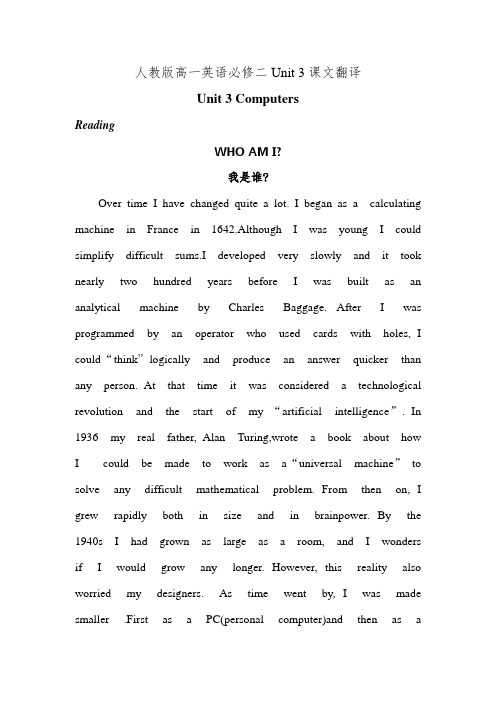
人教版高一英语必修二Unit 3课文翻译Unit 3 ComputersReadingWHO AM I?我是谁?Over time I have changed quite a lot. I began as a calculating machine in France in1642.Although I was young I could simplify difficult sums.I developed very slowly and it took nearly two hundred years before I was built as an analytical machine by Charles Baggage. After I was programmed by an operator who used cards with holes, I could“think”logically and produce an answer quicker than any person. At that time it was considered a technological revolution and the start of my “artificial intelligence”. In 1936my real father, Alan Turing,wrote a book about how I could be made to work as a“universal machine”to solve any difficult mathematical problem. From then on, I grew rapidly both in size and in brainpower. By the 1940s I had grown as large as a room,and I wonders if I would grow any longer. However, this reality also worried my designers.As time went by, I was made smaller.First as a PC(personal computer)and then as alaptop, I have been used in offices and homes since the 1970s.随着时间的推移我被改变了很多。
高级英语第二册课文翻译
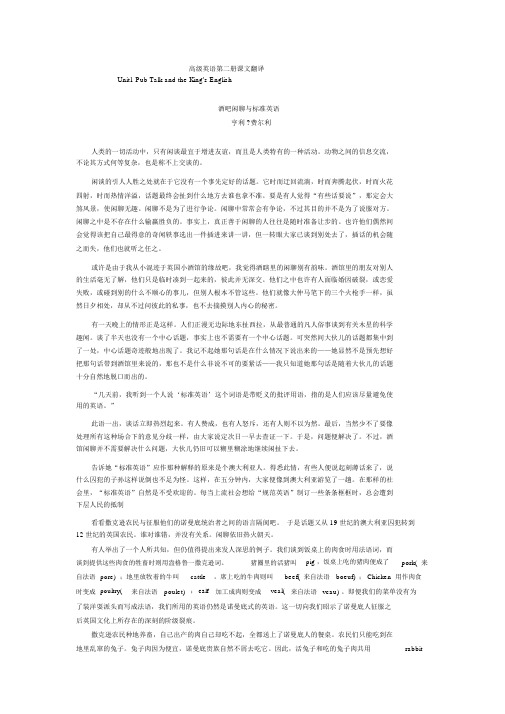
高级英语第二册课文翻译Unit1 Pub Talk and the King's English酒吧闲聊与标准英语亨利 ?费尔利人类的一切活动中,只有闲谈最宜于增进友谊,而且是人类特有的一种活动。
动物之间的信息交流,不论其方式何等复杂,也是称不上交谈的。
闲谈的引人人胜之处就在于它没有一个事先定好的话题。
它时而迂回流淌,时而奔腾起伏,时而火花四射,时而热情洋溢,话题最终会扯到什么地方去谁也拿不准。
要是有人觉得“有些话要说”,那定会大煞风景,使闲聊无趣。
闲聊不是为了进行争论。
闲聊中常常会有争论,不过其目的并不是为了说服对方。
闲聊之中是不存在什么输赢胜负的。
事实上,真正善于闲聊的人往往是随时准备让步的。
也许他们偶然间会觉得该把自己最得意的奇闻轶事选出一件插进来讲一讲,但一转眼大家已谈到别处去了,插话的机会随之而失,他们也就听之任之。
或许是由于我从小混迹于英国小酒馆的缘故吧,我觉得酒瞎里的闲聊别有韵味。
酒馆里的朋友对别人的生活毫无了解,他们只是临时凑到一起来的,彼此并无深交。
他们之中也许有人面临婚因破裂,或恋爱失败,或碰到别的什么不顺心的事儿,但别人根本不管这些。
他们就像大仲马笔下的三个火枪手一样,虽然日夕相处,却从不过问彼此的私事,也不去揣摸别人内心的秘密。
有一天晚上的情形正是这样。
人们正漫无边际地东扯西拉,从最普通的凡人俗事谈到有关木星的科学趣闻。
谈了半天也没有一个中心话题,事实上也不需要有一个中心话题。
可突然间大伙儿的话题都集中到了一处,中心话题奇迹般地出现了。
我记不起她那句话是在什么情况下说出来的——她显然不是预先想好把那句话带到酒馆里来说的,那也不是什么非说不可的要紧话——我只知道她那句话是随着大伙儿的话题十分自然地脱口而出的。
“几天前,我听到一个人说‘标准英语’这个词语是带贬义的批评用语,指的是人们应该尽量避免使用的英语。
”此语一出,谈话立即热烈起来。
有人赞成,也有人怒斥,还有人则不以为然。
张汉熙《高级英语(2)》(第3版重排版)学习指南【词汇短语+课文精解+全文翻译+练习答案】

张汉熙《高级英语(2)》(第3版重排版)学习指南【词汇短语+课文精解+全文翻译+练习答案】目录Lesson 1 Pub Talk and the King’s English 一、词汇短语 二、课文精解 三、文体修辞 四、全文翻译 五、练习答案Lesson 2 Marrakech 一、词汇短语 二、课文精解 三、文体修辞 四、全文翻译 五、练习答案Lesson 3 Inaugural Address (January 20, 1961) 一、词汇短语 二、课文精解 三、文体修辞 四、全文翻译 五、练习答案Lesson 4 Love Is a Fallacy 一、词汇短语 二、课文精解 三、文体修辞 四、全文翻译 五、练习答案Lesson 5 The Sad Young Men 一、词汇短语 二、课文精解 三、文体修辞 四、全文翻译 五、练习答案Lesson 6 Loving and Hating New York 一、词汇短语 二、课文精解 三、文体修辞 四、全文翻译 五、练习答案Lesson 7 The Ones Who Walk Away from Omelas (Excerpts) 一、词汇短语 二、课文精解 三、文体修辞 四、全文翻译 五、练习答案Lesson 8 The Future of the English 一、词汇短语 二、课文精解 三、文体修辞 四、全文翻译 五、练习答案Lesson 9 The Loons 一、词汇短语 二、课文精解 三、文体修辞 四、全文翻译 五、练习答案Lesson 10 The Discovery of What It Means to Be an American 一、词汇短语 二、课文精解 三、文体修辞 四、全文翻译 五、练习答案Lesson 11 Four Laws of Ecology (Part I) 一、词汇短语 二、课文精解 三、文体修辞 四、全文翻译 五、练习答案Lesson 12 Four Laws of Ecology (Part Ⅱ) 一、词汇短语 二、课文精解 三、文体修辞 四、全文翻译 五、练习答案Lesson 13 The Mansion: A Subprime Parable (Excerpts) 一、词汇短语 二、课文精解 三、文体修辞 四、全文翻译 五、练习答案Lesson 14 Faustian Economics 一、词汇短语 二、课文精解 三、文体修辞 四、全文翻译 五、练习答案Lesson 15 Disappearing Through the Skylight 一、词汇短语 二、课文精解 三、文体修辞 四、全文翻译 五、练习答案弘博学习网————各类考试资料全收录内容简介本书是《高级英语(2)》(第3版重排版)的学习辅导用书,按照原教材的课次进行编写,每单元涉及词汇短语、课文精解、单元语法、全文翻译以及练习答案等内容。
高级英语第二册课文翻译
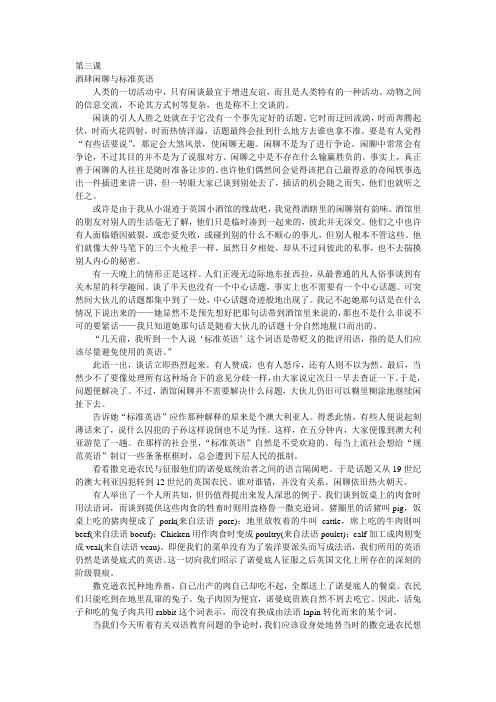
第三课酒肆闲聊与标准英语人类的一切活动中,只有闲谈最宜于增进友谊,而且是人类特有的一种活动。
动物之间的信息交流,不论其方式何等复杂,也是称不上交谈的。
闲谈的引人人胜之处就在于它没有一个事先定好的话题。
它时而迂回流淌,时而奔腾起伏,时而火花四射,时而热情洋溢,话题最终会扯到什么地方去谁也拿不准。
要是有人觉得“有些话要说”,那定会大煞风景,使闲聊无趣。
闲聊不是为了进行争论。
闲聊中常常会有争论,不过其目的并不是为了说服对方。
闲聊之中是不存在什么输赢胜负的。
事实上,真正善于闲聊的人往往是随时准备让步的。
也许他们偶然间会觉得该把自己最得意的奇闻轶事选出一件插进来讲一讲,但一转眼大家已谈到别处去了,插话的机会随之而失,他们也就听之任之。
或许是由于我从小混迹于英国小酒馆的缘故吧,我觉得酒瞎里的闲聊别有韵味。
酒馆里的朋友对别人的生活毫无了解,他们只是临时凑到一起来的,彼此并无深交。
他们之中也许有人面临婚因破裂,或恋爱失败,或碰到别的什么不顺心的事儿,但别人根本不管这些。
他们就像大仲马笔下的三个火枪手一样,虽然日夕相处,却从不过问彼此的私事,也不去揣摸别人内心的秘密。
有一天晚上的情形正是这样。
人们正漫无边际地东扯西拉,从最普通的凡人俗事谈到有关木星的科学趣闻。
谈了半天也没有一个中心话题,事实上也不需要有一个中心话题。
可突然间大伙儿的话题都集中到了一处,中心话题奇迹般地出现了。
我记不起她那句话是在什么情况下说出来的——她显然不是预先想好把那句话带到酒馆里来说的,那也不是什么非说不可的要紧话——我只知道她那句话是随着大伙儿的话题十分自然地脱口而出的。
“几天前,我听到一个人说‘标准英语’这个词语是带贬义的批评用语,指的是人们应该尽量避免使用的英语。
”此语一出,谈话立即热烈起来。
有人赞成,也有人怒斥,还有人则不以为然。
最后,当然少不了要像处理所有这种场合下的意见分歧一样,由大家说定次日一早去查证一下。
于是,问题便解决了。
高级英语第二册课文翻译

第十二课 一个发现:做一个美国人意味着什么
第十三课 为死刑辩护
第十四课 亦爱亦恨话纽约
第一课
迎战卡米尔号飓风
小约翰。柯夏克已料到,卡米尔号飓风来势定然凶猛。就在去年8月17日那个星期天,当卡米尔号飓风越过墨西哥湾向西北进袭之时,收音机和电视里整天不断地播放着飓风警报。柯夏克一家居住的地方一—密西西比州的高尔夫港——肯定会遭到这场飓风的猛烈袭击。路易斯安那、密西西比和亚拉巴马三州沿海一带的居民已有将近15万人逃往内陆安全地带。但约翰就像沿海村落中其他成千上万的人一样,不愿舍弃家园,要他下决心弃家外逃,除非等到他的一家人一—妻子詹妮丝以及他们那七个年龄从三岁到十一岁的孩子一一眼看着就要灾祸临头。
那些从外面返回家乡的人们个个都是慢慢地走动着,也没有谁高声大叫。他们怔住了,呆立当地,不知该怎么才能接受眼前这幅使人惊骇的惨景。他们问道:“我们该怎么办?…‘我们该上哪儿去呢?”
这时,该地区的一些团体,实际上还有全美国的人民,都向沿海受灾地区伸出了援助之手。天还没亮,密西西比州国民警卫队和一些民防队便开进灾区,管理交通,保护财物,建立通讯联络中心,帮助清理废墟并将无家可归的人送往难民收容中心。上午十时许,救世军的流动快餐车和红十字会志愿队及工作人员已开往所有能够到达的地方去分发热饮料、食品、衣服和卧具了。
柯夏克老爹心中窝着一团火,深为自己在飓风面前无能为力而感到懊丧。也说不清为什么,他跑到一问卧室里去将一只杉木箱和一个双人床垫拖进了电视室。就在这里,一面墙壁被风刮倒了,提灯也被吹灭。另外又有一面墙壁在移动,在摇晃。查理.希尔试图以身子撑住它,但结果墙还是朝他这边塌了下来,把他的背部也给砸伤了。房子在颤动摇晃,已从地基上挪开了25英尺。整个世界似乎都要分崩离析了。
- 1、下载文档前请自行甄别文档内容的完整性,平台不提供额外的编辑、内容补充、找答案等附加服务。
- 2、"仅部分预览"的文档,不可在线预览部分如存在完整性等问题,可反馈申请退款(可完整预览的文档不适用该条件!)。
- 3、如文档侵犯您的权益,请联系客服反馈,我们会尽快为您处理(人工客服工作时间:9:00-18:30)。
第三课酒肆闲聊与标准英语1人类的一切活动中,只有闲谈最宜于增进友谊,而且是人类特有的一种活动。
动物之间的信息交流,不论其方式何等复杂,也是称不上交谈的。
2闲谈的引人人胜之处就在于它没有一个事先定好的话题。
它时而迂回流淌,时而奔腾起伏,时而火花四射,时而热情洋溢,话题最终会扯到什么地方去谁也拿不准。
要是有人觉得“有些话要说”,那定会大煞风景,使闲聊无趣。
闲聊不是为了进行争论。
闲聊中常常会有争论,不过其目的并不是为了说服对方。
闲聊之中是不存在什么输赢胜负的。
事实上,真正善于闲聊的人往往是随时准备让步的。
也许他们偶然间会觉得该把自己最得意的奇闻轶事选出一件插进来讲一讲,但一转眼大家已谈到别处去了,插话的机会随之而失,他们也就听之任之。
3或许是由于我从小混迹于英国小酒馆的缘故吧,我觉得酒瞎里的闲聊别有韵味。
酒馆里的朋友对别人的生活毫无了解,他们只是临时凑到一起来的,彼此并无深交。
他们之中也许有人面临婚因破裂,或恋爱失败,或碰到别的什么不顺心的事儿,但别人根本不管这些。
他们就像大仲马笔下的三个火枪手一样,虽然日夕相处,却从不过问彼此的私事,也不去揣摸别人内心的秘密。
4有一天晚上的情形正是这样。
人们正漫无边际地东扯西拉,从最普通的凡人俗事谈到有关木星的科学趣闻。
谈了半天也没有一个中心话题,事实上也不需要有一个中心话题。
可突然间大伙儿的话题都集中到了一处,中心话题奇迹般地出现了。
我记不起她那句话是在什么情况下说出来的——她显然不是预先想好把那句话带到酒馆里来说的,那也不是什么非说不可的要紧话——我只知道她那句话是随着大伙儿的话题十分自然地脱口而出的。
5“几天前,我听到一个人说…标准英语‟这个词语是带贬义的批评用语,指的是人们应该尽量避免使用的英语。
”6此语一出,谈话立即热烈起来。
有人赞成,也有人怒斥,还有人则不以为然。
最后,当然少不了要像处理所有这种场合下的意见分歧一样,由大家说定次日一早去查证一下。
于是,问题便解决了。
不过,酒馆闲聊并不需要解决什么问题,大伙儿仍旧可以糊里糊涂地继续闲扯下去。
7告诉她“标准英语”应作那种解释的原来是个澳大利亚人。
得悉此情,有些人便说起刻薄话来了,说什么囚犯的子孙这样说倒也不足为怪。
这样,在五分钟内,大家便像到澳大利亚游览了一趟。
在那样的社会里,“标准英语”自然是不受欢迎的。
每当上流社会想给“规范英语”制订一些条条框框时,总会遭到下层人民的抵制。
8看看撒克逊农民与征服他们的诺曼底统治者之间的语言隔阂吧。
于是话题又从19世纪的澳大利亚囚犯转到12世纪的英国农民。
谁对谁错,并没有关系。
闲聊依旧热火朝天。
9有人举出了一个人所共知,但仍值得提出来发人深思的例子。
我们谈到饭桌上的肉食时用法语词,而谈到提供这些肉食的牲畜时则用盎格鲁一撒克逊词。
猪圈里的活猪叫pig,饭桌上吃的猪肉便成了pork(来自法语pore);地里放牧着的牛叫cattle,席上吃的牛肉则叫beef(来自法语boeuf);Chicken用作肉食时变成poultry(来自法语poulet);calf加工成肉则变成veal(来自法语vcau)。
即便我们的菜单没有为了装洋耍派头而写成法语,我们所用的英语仍然是诺曼底式的英语。
这一切向我们昭示了诺曼底人征服之后英国文化上所存在的深刻的阶级裂痕。
10撒克逊农民种地养畜,自己出产的肉自己却吃不起,全都送上了诺曼底人的餐桌。
农民们只能吃到在地里乱窜的兔子。
兔子肉因为便宜,诺曼底贵族自然不屑去吃它。
因此,活兔子和吃的兔子肉共用rabbit这个词表示,而没有换成由法语lapin转化而来的某个词。
11当我们今天听着有关双语教育问题的争论时,我们应该设身处地替当时的撒克逊农民想一想,新的统治阶级把法语用来对抗撒克逊农民自己的语言,从而在农民周围筑起一道文化障碍。
当英国人在像觉醒者赫里沃德这样的撒克逊领袖领导下起来造反时,他们一定深深地感受到了文化上的屈辱。
“标准英语”——如果那时候有这个名词的话——已经变成法语。
而九百年后我们在美国这儿仍然继承了这种影响。
12那晚闲聊过后,第二天一早便有人去查阅了资料。
这个名词在16世纪已有人使用过。
纳什作于1593年的《截获信函奇闻》中就有过“标准英语”(Queen‟s English)的提法。
1602年德克写到某人时有句话说:“你把…标准英语‟(King‟s Engligh)简化了”。
莎士比亚作品中是否也出现过这一提法呢?如出现过,那就证明这个词在当时即已通用。
他用过一次,在《温莎的风流娘儿们》中,快嘴桂嫂在讲到她家老爷回来后将会有的盛怒情形时说,“……少不了一顿臭骂,骂得鬼哭神愁,伦敦的官话(即“标准英语”)不知要给他糟蹋成个什么样子啦。
”(朱生豪译)后来的事实果然被她说中了。
13我们有理由认为这个词语就是那个时期产生的。
经过前后五百年的发展和与诺曼底人、安茹王朝及金雀花王朝的法语的竞争,英语最终同化了法语。
被征服者变成了征服者,英语取得了国语的地位。
14这样便有了一种值得引以自豪的“标准英语”。
伊丽莎白时代的人没费吹灰之力,使其影响日盛,遍及全球。
“标准英语”再也不带有今天所谓的种族歧视的性质了。
15不过,那个澳大利亚人所作的解释也有一定的道理。
下层阶级在用这一名词时总带着一点轻蔑或讥讽的味道。
我们会发现,就连快嘴桂嫂这样一个婢女也会说她的主子凯厄斯大夫会管不住自己的舌头,而讲起平民百姓们所讲的那种粗话。
如果说标准英语就是所谓“规范英语”,这种看法常常会受到下层人民的嘲笑讥讽,他们有时故意开玩笑地把它说成是“规反英语”。
下层人民对文化上的专制仍是极为反感的。
16正如卡莱尔所说,始终存在着的一种危险是,“对我们来说。
词语会变成具体的事物”。
词语本身并不是现实,它不过是用以表达现实的一种形式而已。
标准英语就像诺曼底人的盎格鲁法语一样,也是一个阶级用来表达现实的一种形式。
让人们学着去讲也许不错,但既不应当把它作为法令,也不应当使它完全不接受来自下层的改变。
17我一向对词典有着始终不渝的酷爱一奥登说过,一个作家的全部所需就是一支笔、够用的纸张和“他所能弄得到的最好的词典”——但我更赞同另一种说法,即把词典看成是一种常识的工具。
标准英语是一种典范——一种丰富而有指导作用的典范——但并不是一种最高的典范。
18由此我们可以回到我先前的话题上了。
即便是那些学问再高、文学修养再好的人,他们所讲的标准英语在交谈中也常常会离谱走调。
要是有谁闲聊时也像做文章一样句逗分明,或者像写一篇要发表的散文一样咬文嚼字的话,那他讲起话来就一定会极为倒人胃口。
看到E?M?福斯特笔下写出“当今这个时代的阴森可怖的长廊”时,其用语之生动及由其所产生的生动有力、甚至可怖的形象令我们拍案叫绝。
但假若福斯特坐在我们的会客室里说“我们大家正一个接一个地步入这个时代的阴森可怖的长廊”时,那我们完全有理由请他走开。
19常常有一些愚人要求大文豪们谈话时也像写文章一样字字珠玑。
也有些人对18世纪巴黎的文艺沙龙里那些文人雅士的高谈阔论极表称羡。
可是,说不定那些文人雅士们在那里也不过是闲聊,谈论酒食的好坏哩。
当时的巴黎大法院第一厅厅长亨奥尔特在德苏侯爵夫人家的沙龙里作客时就曾大叫着说“调料糟透了”,接着还大发议论说侯爵夫人家的厨子和总厨师长布兰维利耶之间的唯一差别只不过用心不一而已。
20会客室里和餐桌上是无需摆上词典的。
闲聊过程中若遇上弄不明白需待查实的问题可留待第二天再说,不要话说到一半却去一边查起字典来。
否则,谈话便会受到妨碍,不能如流水般无拘无束地进行。
那天晚上,如果我们当场弄清了“标准英语”的意义,也就不可能再有那一场交谈论辩,我们也就不可能一会儿跳到澳大利亚去,一会儿扯回到诺曼底征服者时代了。
21而且,我们也就没有什么可以留到第二天去思考了。
尤为重要的是,如果那个问题当场得到解决的话,人们就不会对于那位引出话题的“火枪手”那样发生兴趣,想多了解她的情况了。
教黑猩猩说话之所以很困难,其原因就在于它们往往可能尽想着要讲出些正经八百的话来,因而使得谈话失去意趣。
3 Pub Talk and the King' s EnglishHenry Fairlie1 Conversation is the most sociable of all human activities. And it is an activity only of humans. However intricate the ways in which animals communicate with each other, they do not indulge in anything that deserves the name of conversation.2 The charm of conversation is that it does not really start from anywhere, and no one has any idea where it will go as it meanders or leaps and sparkles or just glows. The enemy of good conversation is the person who has "something to say." Conversation is not for making a point. Argument may often be a part of it, but the purpose of the argument is not to convince. There is no winning in conversation. In fact, the best conversationalists are those who are prepared to lose. Suddenly they see the moment for one of their best anecdotes, but in a flash the conversation has moved on and the opportunity is lost. They are ready to let it go.3 Perhaps it is because of my up-bringing in English pubs that I think bar conversation has a charm of its own. Bar friends are not deeply involved in each other's lives. They are companions, not intimates. The fact that their marriages may be on the rooks, or that their love affairs have been broken or even that they got out of bed on the wrong side is simply not a concern. They are like the musketeers of Dumas who, although they lived side by side with each other, did not delve into,each other's lives or the recesses of their thoughts and feelings.4 It was on such an occasion the other evening, as the conversation moved desultorily here and there, from the most commonplace to thoughts of Jupiter, without any focus and with no need for one, that suddenly the alchemy of conversation took place, and all at once there was a focus. I do not remember what made one of our companions say it--she clearly had not come into the bar to say it, it was not something that was pressing on her mind--but her remark fell quite naturally into the talk.5 "Someone told me the Other day that the phrase, 'the King's English' was a term of criticism, that it means language which one should not properly use."6 The glow of the conversation burst into flames. There were affirmations and protests and denials, and of course the promise, made in all such conversation, that we would look it up on the morning. That would settle it; but conversation does not need to be settled; it could still go ignorantly on.7 It was an Australian who had given her such a definition of "the King's English," which produced some rather tart remarks about what one could expect from the descendants of convicts. We had traveled in five minutes to Australia. Of course, there would be resistance to the King's English in such a society. There is always resistance in the lower classes to any attempt by an upper class to lay down rules for "English as it should be spoken."8 Look at the language barrier between the Saxon churls and their Norman conquerors. The conversation had swung from Australian convicts of the 19th century to the English peasants of the 12th century. Who was right, who was wrong, did not matter. The conversation was on wings.9 Someone took one of the best-known of examples, which is still always worth the reconsidering. When we talk of meat on our tables we use French words; when we speak of the animals from which the meat comes we use Anglo-Saxon words. It is a pig in its sty ; it is pork (porc) on the table. They are cattle in the fields, but we sit down to beef (boeuf). Chickens become poultry (poulet), and a calf becomes veal (veau). Even if our menus were not wirtten in French out of snobbery, the English we used in them would still be Norman English. What all this tells us is of a deep class rift in the culture of England after the Norman conquest.10 The Saxon peasants who tilled the land and reared the animals could not afford the meat, which went to Norman tables. The peasants were allowed to eat the rabbits that scampered over their fields and, since that meat was cheap, the Norman lords of course turned up their noses at it. So rabbit is still rabbit on our tables, and not changed into some rendering of lapin.11 As we listen today to the arguments about bilingual education, we ought to think ourselves back into the shoes of the Saxon peasant. The new ruling class had built a cultural barrier against him by building their French against his own language. There must have been a great deal of cultural humiliation felt by the English when they revolted under Saxon leaders like Hereward the Wake. "The King's English"--if the term had existed then--had become French. And here in America now, 900 years later, we are still the heirs to it.12 So the next morning, the conversation over, one looked it up. The phrase came into use some time in the 16th century. "Queen's English" is found in Nash's "Strange Newes of the Intercepting Certaine Letters" in 1593, and in 1602, Dekker wrote of someone, "thou clipst the Kinge's English." Is the phrase in Shakespeare? That would be the confirmation that it was in general use. He uses it once, when Mistress Quickly in "The Merry Wives of Windsor" says of her master coming home in a rage, "... here will be an old abusing of God's patience and the King's English," and it rings true.13 One could have expected that it would be about then that the phrase would be coined. After five centuries of growth, o1f tussling with the French of the Normans and the Angevins and the Plantagenets and at last absorbing it, the conquered in the end conquering the conqueror. English had come royally into its own.14 There was a King's (or Queen' s) English to be proud of. The Elizabethans blew on it as on a dandelion clock, and its seeds multiplied, and floated to the ends of the earth. "The King's English" was no longer a form of what would now be regarded as racial discrimination.15 Yet there had been something in the remark of the Australian. The phrase has always been used a little pejoratively and even facetiously by the lower classes. One feels that even Mistress Quickly--a servant--is saying that Dr. Caius--her master--will lose his control and speak with the vigor of ordinary folk. If the King's English is "English as it should be spoken," the claim is often mocked by the underlings, when they say with a jeer "English as it should be spoke." The rebellion against a cultural dominance is still there.16 There is always a great danger, as Carlyle put it, that "words will harden into things for us." Words are not themselves a reality, but only representations of it, and the King's English, like the Anglo-French of the Normans, is a class representation of reality. Perhaps it is worth trying to speak it, but it should not be laid down as an edict , and made immune to change from below.17 I have an unending love affair with dictionaries-Auden once said that all a writer needs is a pen, plenty of paper and "the best dictionaries he can afford"--but I agree with the person who said that dictionaries are instruments of common sense. The King's English is a model—a rich and instructive one--but it ought not to be an ultimatum.18 So we may return to my beginning. Even with the most educated and the most literate, the King's English slips and slides in conversation. There is no worse conversationalist than the one who punctuates his words as he speaks as if he were writing, or even who tries to use words as if he were composing a piece of prose for print. When E. M. Forster writes of " the sinister corridor of our age," we sit up at the vividness of the phrase, the force and even terror in the image. But if E. M. Forster sat in our living room and said, "We are all following each other down the sinister corridor of our age," we would be justified in asking him to leave.19 Great authors are constantly being asked by foolish people to talk as they write. Other people may celebrate the lofty conversations in which the great minds are supposed to have indulged in the great salons of 18th century Paris, but one suspects that the great minds were gossiping and judging the quality of the food and the wine. Henault, then the great president of the First Chamber of the Paris Parlement, complained bitterly of the "terrible sauces " at the salons of Mme. Deffand, and went on to observe that the only difference between her cook and the supreme chef, Brinvilliers , lay in their intentions.20 The one place not to have dictionaries is in a sit ting room or at a dining table. Look the thing up the next morning, but not in the middle of the conversation. Other wise one will bind the conversation, one will not let it flow freely here andthere. There would have been no conversation the other evening if we had been able to settle at one the meaning of "the King's English." We would never hay gone to Australia, or leaped back in time to the Norman Conquest.21 And there would have been nothing to think about the next morning. Perhaps above all, one would not have been engaged by interest in the musketeer who raised the subject, wondering more about her. The bother about teaching chimpanzees how to talk is that they will probably try to talk sense and so ruin all conversation.。
